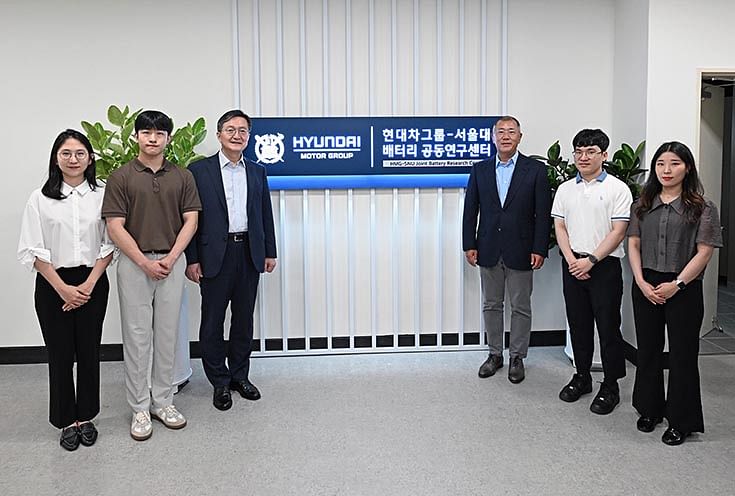Hyundai and Seoul National University open battery research centre, plan 22 joint projects
Collaboration to undertake 22 joint research projects focused on lithium metal batteries, solid-state batteries, battery management systems and battery process technology.
Hyundai Motor Group has announced the inauguration of its Joint Battery Research Center with Seoul National University (SNU). This collaborative effort between the Group and SNU aims to advance battery technologies and foster industry-academia cooperation to establish global leadership in the battery field.
Speaking in a congratulatory speech at the event, Hong Lim Ryu, President of Seoul National University, said: “The Joint Battery Research Center will be the starting point for battery technology with improved performance and robust safety in line with Hyundai Motor Group’s preemptive innovation in the field of electrification. We expect that the best faculty and graduate students will create synergy with Hyundai Motor Group’s competent researchers, laying the groundwork for various innovations ranging from the basics of batteries to applications.”
Hyundai Motor Group Executive Chair Euisun Chung highlighted, “Our mission to develop a diverse range of mobility solutions equipped with advanced batteries is driven by our strong commitment to a sustainable environment for future generations. Through pioneering joint research and development efforts, we hope to empower all researchers to lead the way in propelling the transition to electrification of the mobility industry.”

22 joint research projects
The Joint Battery Research Center began to take shape in November 2021, when the Group and Seoul National University signed an MoU for the ‘establishment of a joint battery research center and mid- to long-term joint research’ based on the consensus on realising carbon neutrality and creating a battery research ecosystem.
To foster close cooperation among researchers, the new research facility will secure a dedicated space for battery-only research. It will consist of seven laboratories and conference rooms for battery development, analysis, measurement, and process. This is the first time that a research facility specializing in electric vehicle (EV) batteries has been built within Seoul National University.
With the opening of the Joint Battery Research Center, the Group will work with top battery experts in Korea to lay the groundwork for R&D of battery-related technologies. The Joint Battery Research Center aims to focus on advanced research into leading next-generation battery technologies that can dramatically increase EV driving distance and shorten charging time, as well as research on battery condition monitoring technology and innovative process technology.
Specifically, a total of 22 joint research projects will be carried out in four divisions, including lithium metal batteries, solid-state batteries, battery management systems (BMS) and battery process technology. A total of 21 professors and master’s and doctorate-level talents from eminent Korean universities will participate in the research. 14 of the 22 research projects will be related to lithium metal and solid-state batteries, focusing their core capabilities on developing next-generation batteries.
In lithium metal batteries, research will be conducted on high-durability lithium-electrolyte material element technology and shape analysis to minimize deterioration, while in the field of solid-state batteries, research will be conducted on sulfide-based anode materials, electrode/electrolyte coating methods and ultra-high energy density cathode active materials.
A key feature of the Joint Research Battery Center will be its focus not only on theoretical research, but also research and development that considers mass production.
To that end, the Joint Battery Research Center has the same level of research infrastructure as the state-of-the-art equipment applied to the Hyundai Motor and Kia R&D centers, such as precision battery analysis equipment, high-precision rheometers, cell manufacturing equipment, and impedance measuring devices, so that the university’s research results can be quickly applied to products.
The Group will have a fully-fledged support system to help the Joint Battery Research Center secure capabilities to develop next-generation batteries. To support the center’s smooth research activities, the Group will invest over KRW 30 billion by 2030. The investment includes the establishment of the center and preparation of experimental equipment.
In addition, researchers from Hyundai Motor and Kia will be dispatched to the center to participate as members of the joint research team, maximizing research synergy through close communication and sharing of expertise. Through consultations and seminars on battery technology, insights and development directions will be discussed, alongside a consultative body that will be formed regularly to share information on global battery industry trends and results.
Above all, the Group expects to pave the way for South Korea to become one of the world’s leading battery technology houses by fostering outstanding talent in the battery sector. Meanwhile the Group is also actively promoting next-generation talent by operating various industry-academic cooperation programs in collaboration with eminent universities in Korea.
ALSO READ Hyundai Motor Group increases annual EV sales target by 2030 to 2 million units
RELATED ARTICLES
Autoliv Plans JV for Advanced Safety Electronics With China’s HSAE
The new joint venture, which is to be located strategically near Shanghai and close to several existing Autoliv sites in...
JLR to Restart Production Over a Month After September Hacking
Manufacturing operations at the Tata Group-owned British luxury car and SUV manufacturer were shut down following a cybe...
BYD UK Sales Jump 880% in September to 11,271 units
Sales record sets the UK apart as the largest international market for BYD outside of China for the first time. The Seal...






 By Autocar Professional Bureau
By Autocar Professional Bureau
 27 Jul 2023
27 Jul 2023
 2479 Views
2479 Views





 Ajit Dalvi
Ajit Dalvi




